21 july 2016
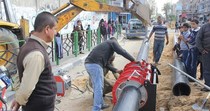
A European parliamentary delegation on Thursday visited locations of vital projects funded by the European Union (EU) in the Gaza Strip and met with officials from the competent authorities.
The delegation, led by French lawmaker Jean Arthuis, visited first the wastewater treatment plant in north Gaza. The project is funded by the EU, the World Bank, France and Sweden.
The European lawmakers also paid an inspection visit to the small desalination plant in south Gaza, where an agreement was signed with the management to raise its productive capacity.
During his meeting with members of the delegation, deputy head of the water authority in Gaza Rabhi al-Sheikh described the water and sewage projects that are funded by the EU and other donors as "an important lever to address the water crisis in Gaza."
He hailed the European support for such projects and highlighted their importance to the population in Gaza.
The delegation, led by French lawmaker Jean Arthuis, visited first the wastewater treatment plant in north Gaza. The project is funded by the EU, the World Bank, France and Sweden.
The European lawmakers also paid an inspection visit to the small desalination plant in south Gaza, where an agreement was signed with the management to raise its productive capacity.
During his meeting with members of the delegation, deputy head of the water authority in Gaza Rabhi al-Sheikh described the water and sewage projects that are funded by the EU and other donors as "an important lever to address the water crisis in Gaza."
He hailed the European support for such projects and highlighted their importance to the population in Gaza.
17 july 2016
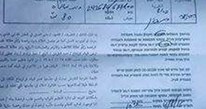
Israeli Occupation Forces (IOF) Sunday morning broke into Froush Beit Dajan village to the east of Nablus city and handed out stop-of-construction notices to Palestinian owners of seven homes.
The Israeli halt of construction orders were issued based on the claim of lacking construction permits from the so called Israeli civil administration.
Azem Mohammad, head of the local village council, told the PIC reporter that the inhabitants of the village complain about their inability to expand their own housing community because of the Israeli ban of construction orders in the area.
The Israeli halt of construction orders were issued based on the claim of lacking construction permits from the so called Israeli civil administration.
Azem Mohammad, head of the local village council, told the PIC reporter that the inhabitants of the village complain about their inability to expand their own housing community because of the Israeli ban of construction orders in the area.
12 july 2016
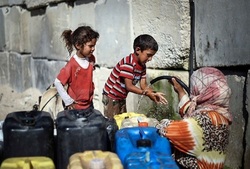
The Turkish Minister of Forestry and Water Affairs announced, Tuesday, that Turkey is to establish a seawater desalination plant to solve water crisis, estimating the coast of the project to $300,000,000 USD.
The minister noted, according to Al Ray, that the project is big-ticket, noting that some countries announced that they will contribute to the project.
Gaza water infrastructure has shuddered under the burden of an almost decade-long Israeli-Egyptian siege.
Three major Israeli wars on Gaza since 2008 have only exacerbated the problem, with jets bombing every square kilometre of the strip, inflicting damage onto reservoirs above and pipelines below the ground.
The director of Coastal Municipalities Water Utility in Gaza explained that the proportion of groundwater that is unfit for drinking is more than 97%.
09/03/15 United Nations: Gaza Could Be Uninhabitable Within 5 Years
He added that the amount of chloride in the groundwater is higher than the normal average according to the Palestinian specification and the standards of World Health Organization which estimated the chloride in the water up to 1.500 milligrams per liter.
However, the standards of World Health organization warns of the increasing of chloride in water to more than 400 milligrams per liter.
The minister noted, according to Al Ray, that the project is big-ticket, noting that some countries announced that they will contribute to the project.
Gaza water infrastructure has shuddered under the burden of an almost decade-long Israeli-Egyptian siege.
Three major Israeli wars on Gaza since 2008 have only exacerbated the problem, with jets bombing every square kilometre of the strip, inflicting damage onto reservoirs above and pipelines below the ground.
The director of Coastal Municipalities Water Utility in Gaza explained that the proportion of groundwater that is unfit for drinking is more than 97%.
09/03/15 United Nations: Gaza Could Be Uninhabitable Within 5 Years
He added that the amount of chloride in the groundwater is higher than the normal average according to the Palestinian specification and the standards of World Health Organization which estimated the chloride in the water up to 1.500 milligrams per liter.
However, the standards of World Health organization warns of the increasing of chloride in water to more than 400 milligrams per liter.
11 july 2016
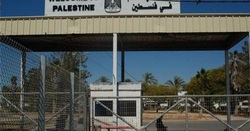
Israeli Occupation Authorities (IOA) denied Sunday the entry of an Italian parliamentary delegation headed by Deputy Speaker of the Parliament, Luigi de Maio, into the blockaded Gaza Strip.
Italian Five Star Movement revealed in a statement issued Sunday that Israeli authorities informed the delegation of its decision to deny their access into Gaza.
The delegation had arranged the visit to check on the construction work of the Italian-funded projects in Gaza.
However, the delegation will be forced to head to the West Bank instead of Gaza. After being denied, Luigi de Maio criticized in televised statements the Israeli “bad” decision, saying that it contravened the international efforts to revive the peace process.
Israeli authorities justified its decision for “security reasons”.
Italian Five Star Movement revealed in a statement issued Sunday that Israeli authorities informed the delegation of its decision to deny their access into Gaza.
The delegation had arranged the visit to check on the construction work of the Italian-funded projects in Gaza.
However, the delegation will be forced to head to the West Bank instead of Gaza. After being denied, Luigi de Maio criticized in televised statements the Israeli “bad” decision, saying that it contravened the international efforts to revive the peace process.
Israeli authorities justified its decision for “security reasons”.
10 july 2016

MP Jamal al-Khudari, head of the popular committee against the siege, called on the donor countries to abide by their pledges for Gaza reconstruction to end the suffering of its 70,000 displaced families due to the Israeli aggression since 2014.
In a statement on Saturday, Khudari underlined that the donors have paid 35% only of their pledges; while the siege, the closure of the crossings, and the restriction on the entry of construction materials had obstructed the reconstruction process.
“Lifting the siege on Gaza is the most important gate to the reconstruction and ending the humanitarian crisis in the Gaza Strip”, he said.
MP Khudari called for uniting the Palestinian efforts to alleviate the crises' level. He revealed that thousands of Gazan families are still living in caravans or small rented homes.
In a statement on Saturday, Khudari underlined that the donors have paid 35% only of their pledges; while the siege, the closure of the crossings, and the restriction on the entry of construction materials had obstructed the reconstruction process.
“Lifting the siege on Gaza is the most important gate to the reconstruction and ending the humanitarian crisis in the Gaza Strip”, he said.
MP Khudari called for uniting the Palestinian efforts to alleviate the crises' level. He revealed that thousands of Gazan families are still living in caravans or small rented homes.
9 july 2016
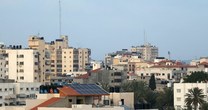
The Palestinian government revealed that donor countries paid only 40% of total aid commitments towards Gaza reconstruction after Israel’s 2014 aggression on the Strip.
The Palestinian national team for Gaza reconstruction said only $1.4 billion were paid out of $5.4 billion pledged by donor countries during Gaza reconstruction conference in Cairo.
State of Kuwait's grant to Palestine, amounting to US$ 200 million, is considered the highest, the team said in its report.
The PA government has recently reached an agreement with the Islamic Bank for Development and the state of Qatar to facilitate Gaza reconstruction funding. 171,000 Palestinian houses damaged during the 51-day aggression on Gaza are still in need for reconstruction, according to the report.
Gaza’s agricultural sector suffered losses and damages that exceeded $250 million. Only $75.4 million were provided for its reconstruction. 5,153 facilities of the economic sector were also damaged during the aggression.
The report also pointed to the development made in educational sector where 96% of the damaged public schools, 100% of UNRWA schools, 50% of universities, and 66% of kindergartens were rebuilt after being partially or totally destroyed during the aggression.
In July 2014, Israel launched an offensive on the besieged coastal enclave, which killed over 2,300 Palestinians, mostly civilians.
The Palestinian national team for Gaza reconstruction said only $1.4 billion were paid out of $5.4 billion pledged by donor countries during Gaza reconstruction conference in Cairo.
State of Kuwait's grant to Palestine, amounting to US$ 200 million, is considered the highest, the team said in its report.
The PA government has recently reached an agreement with the Islamic Bank for Development and the state of Qatar to facilitate Gaza reconstruction funding. 171,000 Palestinian houses damaged during the 51-day aggression on Gaza are still in need for reconstruction, according to the report.
Gaza’s agricultural sector suffered losses and damages that exceeded $250 million. Only $75.4 million were provided for its reconstruction. 5,153 facilities of the economic sector were also damaged during the aggression.
The report also pointed to the development made in educational sector where 96% of the damaged public schools, 100% of UNRWA schools, 50% of universities, and 66% of kindergartens were rebuilt after being partially or totally destroyed during the aggression.
In July 2014, Israel launched an offensive on the besieged coastal enclave, which killed over 2,300 Palestinians, mostly civilians.
6 july 2016
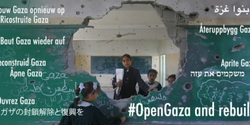
Two years since the outbreak of the 2014 war that cost the lives of 2,492 Palestinian civilians, including 551 children, much of the Gaza Strip remains in ruins.
Entire neighborhoods remain cut off from water supplies, destroyed hospitals and clinics have not yet been rebuilt, and tens of thousands remain without a home.
While some reconstruction has progressed, the situation in Gaza remains dire. Less than 10% of the 11,000 homes that were completely destroyed during the 51 day bombardment have been rebuilt. As a result of the war and the impact of the blockade imposed in 2007 by Israel, more than 75,000 Palestinians in Gaza still have no home to return to.
“Two years since the beginning of the war, the blockade is severely impeding reconstruction and recovery in Gaza. Unless it is lifted, Palestinians living in Gaza will be unable to move on with their lives and live in freedom, dignity, and safety,” Oxfam Country Director Chris Eijkemans said, according to the PNN.
“When the ceasefire began, world leaders promised to work towards sustainable and long-term development for Palestinians living in Gaza. However, there is little evidence of those promises on the ground.”
International organizations working in the occupied Palestinian territory are sounding the alarm on the lack of progress in Gaza’s reconstruction as a result of Israel’s heavy restrictions on the entry of materials critical to the recovery process. The organizations called on world leaders to live up to their commitments and press for an immediate end to the blockade.
The almost decade long blockade has crippled Gaza’s economy. Without the ability to sell to external markets, private sector employment has plummeted. Overall unemployment is above 40%, with Gaza’s youth unemployment among the highest in the world.
The impact of the blockade on children is particularly devastating, and tens of thousands of children remain without a home as a result of the 2014 conflict. “Half of Gaza’s population are children, many of whom have lived their whole life under blockade. Hundreds of children requiring vital medical treatment are prevented from leaving Gaza. Two years on, the root causes of their suffering have still not been addressed,” said Fikr Shalltoot, Director of Programmes in Gaza for Medical Aid for Palestinians.
Mr Eijkemans said that lifting the blockade is the only solution to give people access to the basic services they desperately need, to allow reconstruction to proceed in full, and to allow Gaza’s crippled economy to restore.
“The blockade is illegal under international law and amounts to collective punishment of an entire population. Only its immediate end will bring about long-term security for Palestinians and Israelis alike.”
According to UN statistics, Palestinians now make up the largest percentage of refugees in the entire world.
Entire neighborhoods remain cut off from water supplies, destroyed hospitals and clinics have not yet been rebuilt, and tens of thousands remain without a home.
While some reconstruction has progressed, the situation in Gaza remains dire. Less than 10% of the 11,000 homes that were completely destroyed during the 51 day bombardment have been rebuilt. As a result of the war and the impact of the blockade imposed in 2007 by Israel, more than 75,000 Palestinians in Gaza still have no home to return to.
“Two years since the beginning of the war, the blockade is severely impeding reconstruction and recovery in Gaza. Unless it is lifted, Palestinians living in Gaza will be unable to move on with their lives and live in freedom, dignity, and safety,” Oxfam Country Director Chris Eijkemans said, according to the PNN.
“When the ceasefire began, world leaders promised to work towards sustainable and long-term development for Palestinians living in Gaza. However, there is little evidence of those promises on the ground.”
International organizations working in the occupied Palestinian territory are sounding the alarm on the lack of progress in Gaza’s reconstruction as a result of Israel’s heavy restrictions on the entry of materials critical to the recovery process. The organizations called on world leaders to live up to their commitments and press for an immediate end to the blockade.
The almost decade long blockade has crippled Gaza’s economy. Without the ability to sell to external markets, private sector employment has plummeted. Overall unemployment is above 40%, with Gaza’s youth unemployment among the highest in the world.
The impact of the blockade on children is particularly devastating, and tens of thousands of children remain without a home as a result of the 2014 conflict. “Half of Gaza’s population are children, many of whom have lived their whole life under blockade. Hundreds of children requiring vital medical treatment are prevented from leaving Gaza. Two years on, the root causes of their suffering have still not been addressed,” said Fikr Shalltoot, Director of Programmes in Gaza for Medical Aid for Palestinians.
Mr Eijkemans said that lifting the blockade is the only solution to give people access to the basic services they desperately need, to allow reconstruction to proceed in full, and to allow Gaza’s crippled economy to restore.
“The blockade is illegal under international law and amounts to collective punishment of an entire population. Only its immediate end will bring about long-term security for Palestinians and Israelis alike.”
According to UN statistics, Palestinians now make up the largest percentage of refugees in the entire world.
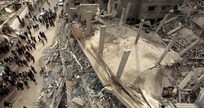
UNRWA announced that 6,303 Gazan refugee families have not received payments to start repairing their totally destroyed homes.
Total estimated costs for reconstruction are 283.6 million dollars. In a report, UNRWA revealed that payments to 23 refugee families have been made to restore their totally destroyed homes in Gaza Strip.
Payments should also be continued to another 1000 refugee families.
The report disclosed that over 1.88 million American dollars was paid last week for reconstruction, repair works and cash aid for rentals.
Funding will reach a total of 882 refugee families in the besieged enclave. Approximately 8,000 refugee families still displaced by the 2014 conflict have not received transitional shelter cash assistance (TSCA) for the second quarter in in 2016, the report pointed out.
The report stated that for repairs of damages of all categories (minor, major and severe), the principal barrier to completing the outstanding repairs is funding.
If current conditions remain, including adequate amounts of building material entering Gaza, UNRWA estimates that repairs could be completed within six months from receipt of sufficient funding.
Total estimated costs for reconstruction are 283.6 million dollars. In a report, UNRWA revealed that payments to 23 refugee families have been made to restore their totally destroyed homes in Gaza Strip.
Payments should also be continued to another 1000 refugee families.
The report disclosed that over 1.88 million American dollars was paid last week for reconstruction, repair works and cash aid for rentals.
Funding will reach a total of 882 refugee families in the besieged enclave. Approximately 8,000 refugee families still displaced by the 2014 conflict have not received transitional shelter cash assistance (TSCA) for the second quarter in in 2016, the report pointed out.
The report stated that for repairs of damages of all categories (minor, major and severe), the principal barrier to completing the outstanding repairs is funding.
If current conditions remain, including adequate amounts of building material entering Gaza, UNRWA estimates that repairs could be completed within six months from receipt of sufficient funding.
29 june 2016
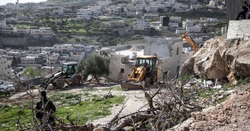
Israeli Occupation forces (IOF) handed out demolition notices to Palestinians residing in al-Ras al-Ahmar area in the northern Jordan Valley.
The notices stipulated knocking down a number of civic facilities. Mutaz Bsharat, the official of Jordan Valley file, said that among the structures to be demolished there are homes, tents, stockyards, and housing facilities in addition to a water line extending along 1000 meters.
The notices also included a stop-of-construction order against a home belonging to the family of Raed Bsharat. It is located in the same area.
The notices stipulated knocking down a number of civic facilities. Mutaz Bsharat, the official of Jordan Valley file, said that among the structures to be demolished there are homes, tents, stockyards, and housing facilities in addition to a water line extending along 1000 meters.
The notices also included a stop-of-construction order against a home belonging to the family of Raed Bsharat. It is located in the same area.
20 june 2016
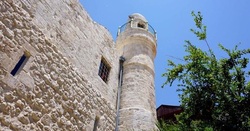
A Turkish association renovated 45 mosques and over 70 homes in the occupied Palestinian territories, Khales Mutlu, from the Turkish Association for the Protection and Revival of the Ottoman Heritage in Occupied Jerusalem and its Environs, said Sunday.
According to Khales Mutlu, 4,000 Palestinian homes need maintenance in the Old City of Occupied Jerusalem.
The Turkish activist spoke out against the hindrances laid by the Israeli occupation to obstruct the maintenance works, including setting up deadlines for the end of renovation activities.
Any building which is not renovated within that time limit is automatically subjected to demolition.
Mutlu further warned of Israel’s ongoing confiscation of sacred places of worship in old neighborhoods by resorting to such laws as the loss of property law which gives Israel green light to confiscate, demolish, or buy abandoned Palestinian property.
He added that Israel prevented the renovation of several sacred places of worship in Haifa and Occupied Jerusalem. Fathiya Qatina, the owner of one of the newly renovated buildings, said her home, which has been a shelter for over five families, was on the verge of collapse.
“We did not have enough money to renovate the house. The Israelis wanted to buy it, which we firmly refused,” said the house owner. “I thank the Turkish volunteers for their urgent intervention. Every time I look at the building, I pray for them.”
According to Khales Mutlu, 4,000 Palestinian homes need maintenance in the Old City of Occupied Jerusalem.
The Turkish activist spoke out against the hindrances laid by the Israeli occupation to obstruct the maintenance works, including setting up deadlines for the end of renovation activities.
Any building which is not renovated within that time limit is automatically subjected to demolition.
Mutlu further warned of Israel’s ongoing confiscation of sacred places of worship in old neighborhoods by resorting to such laws as the loss of property law which gives Israel green light to confiscate, demolish, or buy abandoned Palestinian property.
He added that Israel prevented the renovation of several sacred places of worship in Haifa and Occupied Jerusalem. Fathiya Qatina, the owner of one of the newly renovated buildings, said her home, which has been a shelter for over five families, was on the verge of collapse.
“We did not have enough money to renovate the house. The Israelis wanted to buy it, which we firmly refused,” said the house owner. “I thank the Turkish volunteers for their urgent intervention. Every time I look at the building, I pray for them.”
18 june 2016
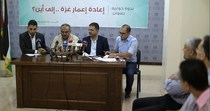
The Government Information Office in Gaza held a seminar on the reconstruction process of Gaza as the second anniversary of the Israeli 2014 aggression approaches, while the people of Gaza are still wondering when their houses will be rebuilt.
Naji Sarhan, Undersecretary of the Ministry of Public Works and Housing, stressed that the reconstruction process is moving very slowly for many reasons, including that a number of donors have not yet fulfilled their promises of providing the needed financial support, and the Israeli mechanism of providing Gaza with cement.
Sarhan pointed out that the Israeli aggression left 11,000 completely destroyed and 175,000 partially destroyed housing units. He said that owners of 17,000 houses are still homeless living in caravans, on the rubble of their houses or with their relatives.
He mentioned that the funding required for housing whether installing caravans or providing housing allowance is $150 million; “We only have $60 million,” he said.
In addition, $340 million is needed for reforming the partial destruction, while only $156 million is available.
“The reconstruction process has already started for around 6,000 housing units,” said Sarhan, adding that the Ministry of Public Works and Housing has the required plans and logistics for the reconstruction but the access of building materials on the current basis is not helping.
He stated that the Gaza Strip needs more than 400,000 tons of cement, yet what Israel daily allows to enter Gaza is 3,000 tons.
Barriers
Adnan Abu Hasna, the Gaza spokesman for the UN Relief and Works Agency, stated that the obstacles facing the reconstruction of Gaza are the lack of funding, as the UNRWA only received 30% of the pledged funds, and the Israeli restrictions on the entry of construction materials.
He said that the UNRWA is working with the available funds, pointing out that the Islamic Bank has provided funds for rebuilding 260 housing units.
PA’s role
The Palestinian economic analyst Nihad Nashwan mentioned that there are no real efforts to push the reconstruction process, as the amount of cement allowed into Gaza will take 20 years to revive Gaza from the losses of 2014.
Nashwan questioned the role of the Palestinian Authority, as its budgets allocate nothing for the reconstruction of Gaza.
He demanded the PA to play its role in raising the allowed cement amounts into Gaza, pointing out that the reconstruction of Gaza needs to follow a particular timetable. He finally concluded that the destroyed economic establishments in Gaza received very small funds compared to their losses.
Naji Sarhan, Undersecretary of the Ministry of Public Works and Housing, stressed that the reconstruction process is moving very slowly for many reasons, including that a number of donors have not yet fulfilled their promises of providing the needed financial support, and the Israeli mechanism of providing Gaza with cement.
Sarhan pointed out that the Israeli aggression left 11,000 completely destroyed and 175,000 partially destroyed housing units. He said that owners of 17,000 houses are still homeless living in caravans, on the rubble of their houses or with their relatives.
He mentioned that the funding required for housing whether installing caravans or providing housing allowance is $150 million; “We only have $60 million,” he said.
In addition, $340 million is needed for reforming the partial destruction, while only $156 million is available.
“The reconstruction process has already started for around 6,000 housing units,” said Sarhan, adding that the Ministry of Public Works and Housing has the required plans and logistics for the reconstruction but the access of building materials on the current basis is not helping.
He stated that the Gaza Strip needs more than 400,000 tons of cement, yet what Israel daily allows to enter Gaza is 3,000 tons.
Barriers
Adnan Abu Hasna, the Gaza spokesman for the UN Relief and Works Agency, stated that the obstacles facing the reconstruction of Gaza are the lack of funding, as the UNRWA only received 30% of the pledged funds, and the Israeli restrictions on the entry of construction materials.
He said that the UNRWA is working with the available funds, pointing out that the Islamic Bank has provided funds for rebuilding 260 housing units.
PA’s role
The Palestinian economic analyst Nihad Nashwan mentioned that there are no real efforts to push the reconstruction process, as the amount of cement allowed into Gaza will take 20 years to revive Gaza from the losses of 2014.
Nashwan questioned the role of the Palestinian Authority, as its budgets allocate nothing for the reconstruction of Gaza.
He demanded the PA to play its role in raising the allowed cement amounts into Gaza, pointing out that the reconstruction of Gaza needs to follow a particular timetable. He finally concluded that the destroyed economic establishments in Gaza received very small funds compared to their losses.
